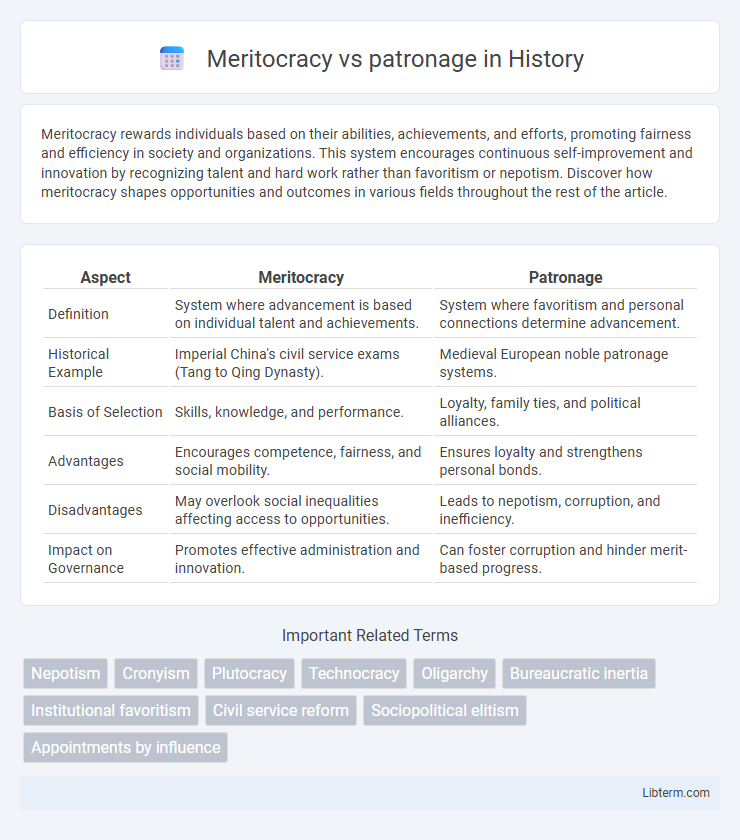Meritocracy rewards individuals based on their abilities, achievements, and efforts, promoting fairness and efficiency in society and organizations. This system encourages continuous self-improvement and innovation by recognizing talent and hard work rather than favoritism or nepotism. Discover how meritocracy shapes opportunities and outcomes in various fields throughout the rest of the article.
Table of Comparison
| Aspect | Meritocracy | Patronage |
|---|---|---|
| Definition | System where advancement is based on individual talent and achievements. | System where favoritism and personal connections determine advancement. |
| Historical Example | Imperial China's civil service exams (Tang to Qing Dynasty). | Medieval European noble patronage systems. |
| Basis of Selection | Skills, knowledge, and performance. | Loyalty, family ties, and political alliances. |
| Advantages | Encourages competence, fairness, and social mobility. | Ensures loyalty and strengthens personal bonds. |
| Disadvantages | May overlook social inequalities affecting access to opportunities. | Leads to nepotism, corruption, and inefficiency. |
| Impact on Governance | Promotes effective administration and innovation. | Can foster corruption and hinder merit-based progress. |
Understanding Meritocracy: Principles and Purpose
Meritocracy is a system in which individuals are selected and promoted based on their abilities, skills, and achievements rather than on personal connections or favoritism. Its core principles emphasize fairness, competence, and equal opportunity, ensuring that talent and hard work drive advancement in education, employment, and governance. Understanding meritocracy highlights the importance of objective criteria and performance metrics to foster innovation, efficiency, and social mobility, contrasting sharply with patronage systems that prioritize loyalty and relationships over merit.
Defining Patronage: Origins and Mechanics
Patronage originates from ancient systems where influential individuals or elites provided resources and opportunities in exchange for loyalty and support, forming a network of reciprocal obligations. The mechanics of patronage revolve around favoritism based on personal relationships rather than merit, often undermining institutional fairness and equity. This system contrasts sharply with meritocracy, as patronage prioritizes social connections over qualifications and achievements in decision-making processes.
Historical Contexts of Meritocracy and Patronage
Meritocracy historically emerged during the Enlightenment as a system where individuals advanced based on talent and achievement, contrasting with patronage systems rooted in ancient aristocracies and feudal societies where power was distributed through personal connections and loyalty. Civil service exams in Imperial China exemplify early meritocratic principles, while European monarchies often relied on patronage to maintain loyalty among nobles. The tension between meritocracy and patronage reflects broader societal shifts from hereditary privilege toward bureaucratic efficiency and professional competence.
Advantages of a Meritocratic System
A meritocratic system ensures that individuals are selected and promoted based on their skills, qualifications, and performance, leading to increased efficiency and productivity within organizations. This approach fosters innovation and motivation by rewarding talent and hard work, reducing favoritism and corruption often found in patronage systems. By prioritizing merit, organizations build a competent workforce that drives sustainable growth and enhances overall governance quality.
Drawbacks and Critiques of Meritocracy
Meritocracy often faces criticism for reinforcing existing social inequalities by favoring individuals from privileged backgrounds who have greater access to education and resources. This system can perpetuate elitism and overlook diverse talents by prioritizing standardized measures of achievement, such as test scores and credentials. Furthermore, meritocracy may undervalue the role of social networks and patronage, which are crucial in many cultures for securing opportunities and support.
The Role of Patronage in Governance and Business
Patronage in governance and business often undermines meritocracy by prioritizing loyalty and personal connections over skills and qualifications, leading to inefficiencies and corruption. This system can distort resource allocation, weaken institutional integrity, and perpetuate inequality by favoring individuals based on relationship networks rather than merit-based achievements. In contrast, meritocratic systems promote transparency, accountability, and performance-driven outcomes, fostering sustainable development and innovation within organizations and governments.
Negative Consequences of Patronage Systems
Patronage systems often lead to corruption, inefficiency, and the misallocation of resources by prioritizing loyalty over competence. Such practices undermine meritocracy, resulting in unqualified individuals holding key positions and eroding public trust in institutions. This environment stifles innovation and hampers overall societal and economic development.
Meritocracy vs Patronage: Impact on Social Mobility
Meritocracy fosters social mobility by rewarding individuals based on talent, effort, and achievements, enabling equal opportunities for advancement regardless of background. Patronage, in contrast, limits social mobility by prioritizing loyalty and personal connections over merit, often perpetuating inequality and social stratification. Societies emphasizing meritocracy tend to experience higher innovation and economic growth due to a more efficient allocation of human capital.
Case Studies: Real-World Examples of Both Systems
Singapore exemplifies meritocracy with its Civil Service promoting talent-based advancement, leading to efficient governance and economic growth. In contrast, political patronage in countries like Argentina highlights how favoritism can undermine institutional transparency and foster corruption. These case studies reveal meritocracy's role in fostering development versus patronage's tendency to entrench power and inefficiency.
Building a Fairer System: Reform and Policy Recommendations
Reforming meritocracy requires dismantling patronage networks that prioritize personal connections over competence, thereby enhancing transparency and accountability in hiring and promotion processes. Policy recommendations include implementing standardized evaluations, promoting equal access to education and training, and enforcing anti-corruption measures to ensure fair competition. Creating a fairer system involves integrating data-driven performance metrics and inclusive governance structures to reduce bias and foster social mobility.
Meritocracy Infographic

 libterm.com
libterm.com